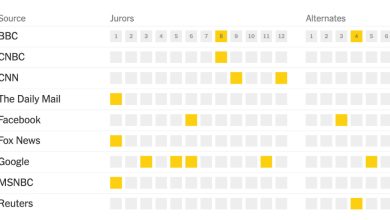The Soul of Democracy Is on the Ballot in Israel and America

Israel’s unprecedented national unity government sadly collapsed last week. Why should you care? Because in so many ways what ails Israeli politics today is just the Off Broadway version of the hyper-partisanship that has infected U.S. politics.
The victory-at-any-cost mentality of the Trump far right — which was vividly described in Washington on Tuesday during Cassidy Hutchinson’s testimony to the Jan. 6 committee — is part of a broader trend of deeply antidemocratic values that are at odds with what many Americans and Israelis still aspire to. If this trend prevails, it will tear apart both societies, which is why the soul of Israeli democracy and the soul of American democracy are on the ballot in their next elections.
It is not inevitable. Bucking all the recent political trends — and in the wake of three inconclusive elections in two years — Israel did something quite remarkable a year ago: It put together a governing national unity coalition that for the first time included not only right-wing and left-wing Israeli Jews but also an Israeli Arab Islamist party that had won four seats in Parliament in the March 2021 election.
The core of this coalition was Prime Minister Naftali Bennett’s right-wing Yamina party; Foreign Minister Yair Lapid’s center-left Yesh Atid party; and Mansour Abbas’s Israeli Arab Muslim religious party, known as Raam.
Imagine that Joe Biden, Mitt Romney, Liz Cheney, Larry Hogan, Lisa Murkowski, Charlie Baker, retired admiral Bill McRaven, Joe Manchin, Amy Klobuchar, Mike Bloomberg, Jim Clyburn and Michelle Lujan Grisham were all serving in the same cabinet and you’d have the rough U.S. equivalent of the Israeli national unity government that just died.
I believe these kinds of left-right-center coalitions — making pragmatic decisions and trade-offs that transcend the usual ideological poles — are the only way to effectively govern democracies in this era of rapid technological, demographic and climate change.
Unless the left and right come toward the center to find a way to govern together in Israel and America, both nations will stagnate, as their citizens and leaders prove incapable of doing the big and hard things — from education to immigration to industrial policy — needed to thrive in the 21st century. Today, so much energy just goes into their major parties doing and undoing each other’s work. (See dictionary for: Roe v. Wade, gun control, immigration, U.S. energy policy. …)
Although it lasted only a year, Israel’s unity coalition was able to pass a national budget in November that balanced a wide spectrum of interests. That may seem puny, but it was Israel’s first national budget based on national priorities in more than three years.
Perhaps more than anything else, the unity coalition was able to demonstrate that Israeli Jews and Arabs can calmly govern together — a historic breakthrough. I spoke with Bennett just before his government fell. Bennett had manifested political courage to go against many in his base by allying with Abbas, and I was struck by the respect and kindness that Bennett expressed for his Israeli Arab Muslim governing partner, who had defied many in his own base to align with Abbas and Lapid. It’s called leadership.
Their government also gave Israelis a brief vacation from the divisiveness promoted by former Prime Minister Benjamin Netanyahu and his ultranationalist racist allies. Netanyahu manifests another kind of leadership. It’s just like Donald Trump’s. Indeed, Netanyahu and Trump are political brothers from different mothers.
They share a scorched-earth approach to politics that says the way you gain and hold power is not by building a broad coalition from the center outward. Instead, it’s by mobilizing and radicalizing your base against “the other” — and then using all that negative energy to attack the institutional, media and judicial restraints to distract the public from your grifts and power grabs.
Bibi is under indictment for bribery, fraud and breach-of-trust charges and hopes his re-election will save him from a possible prison term. Trump is hoping that his actions around Jan. 6 don’t lead him to be indicted for conspiring to overturn our last election. Bibi and Trump were each called out for anti-democratic behavior by an attorney general they appointed.
Netanyahu and his followers mounted a merciless attack on the members of Bennett’s party who participated in the national unity coalition, eventually breaking off a few to topple the government. But just to make his cynicism complete, Netanyahu brought the government down by leading a vote against a renewal of the two-tier legal system that allows Israeli settlers in the West Bank to live under Israeli civilian law, instead of under the military law by which Israel governs the Palestinians.
This two-tier system has been regularly renewed, and Netanyahu’s settler constituency cannot survive without it. But to deny the unity government the capacity to govern, Netanyahu rallied a vote against it.
Bennett’s tacit motto was, “We have a country to manage,” while Netanyahu’s was, “We have a government to topple.”
Even though their government lasted only a year, Bennett, Lapid and Abbas demonstrated that the seemingly impossible was possible, and a lot of Israelis quietly appreciated it. That reality — and the new math of Israeli politics — suggests to me it can make a comeback one day.
What math? The Israeli center-left and center-right parties do not have enough votes together to easily make a governing majority. But neither do the right-wing parties. In the past, the Israeli religious parties would auction themselves off to the left and the right coalitions — throwing their votes behind whichever coalition offered the most funding for Orthodox religious schools.
But thanks to Netanyahu and his pals, the religious parties in Israel have been radicalized and will no longer form governments with the center-left, which also increasingly resents having to buy off the Orthodox parties.
So, guess who came to dinner to replace the Jewish religious parties?
An Israeli Arab Muslim party led by Abbas.
Most Israeli Arabs had shunned playing inside Israeli politics; they created their own, largely irrelevant, far-left pro-Palestinian parties that were usually shunned by Jewish parties as partners. But Israeli Arabs make up roughly 21 percent of Israel. With the Jews evenly divided, the Israeli Arabs have the potential to become the new swing vote and use that power to get more funding for their schools, towns and police. That was Mansour Abbas’s great insight.
To that end, Abbas basically told the other Israeli Arab parties to take a hike. He would play in the center of Israeli politics. Although some members of his base resisted, Abbas drew support from many Israeli Arabs fed up with the corruption and drift within the Palestinian Authority in the West Bank and the brutality and incompetence of Hamas in Gaza. They wanted to focus on their lives in Israel.
Bibi immediately saw this threat. So first, he tried to court Abbas for his own coalition, and when that failed, in true Bibi fashion, he tried to make Abbas radioactive so no one else could align with him. As The Times of Israel reported, Netanyahu “falsely” claimed that Abbas’s party “is an antisemitic, anti-Zionist party that supports terrorism and represents the Muslim Brotherhood, which seeks to destroy Israel.” Bibi also accused Bennett of governing with “supporters of terrorism.”
No surprise here: Netanyahu cannot allow Israeli Arabs to become the swing vote in Israeli politics, especially one like Abbas, who does not challenge the legitimacy of Israel and who explicitly acknowledges the pain of the Holocaust. He declared in a speech in the Knesset two years ago, “I bow my head before the heroism of women and men who started the Warsaw Ghetto uprising.”
Hebrew University religious philosopher Moshe Halbertal summed it all up for me: Israel’s national unity coalition “was a very promising breakthrough of shared governance by Arabs and Jews in Israel. No one can erase it, even with all the ultranationalist pressures portraying the Israeli Arabs as a fifth column. So now Israeli voters will have to decide: Do they want a country that is inclusive and capable of offering respect and dignity to all of its citizens or a country based on the negation of the other?”
For that reason, Halbertal added, “The soul of Israel is on the ballot in our next election.”
And so, too, is America’s. Hutchinson, who was a top White House aide in the Trump administration, made that painfully clear on Capitol Hill on Tuesday, when she spoke eloquently of how her own sense of patriotism and duty as an American was violated by the actions of Trump and his allies. Hutchinson did not dwell on electoral politics, but she did something far more important — she forced us to ask ourselves, with her testimony, what kind of country do we want to be, what kind of leaders do we want to have, what sort of soul is at the core of America.
The Times is committed to publishing a diversity of letters to the editor. We’d like to hear what you think about this or any of our articles. Here are some tips. And here’s our email: [email protected].
Follow The New York Times Opinion section on Facebook, Twitter (@NYTopinion) and Instagram.




